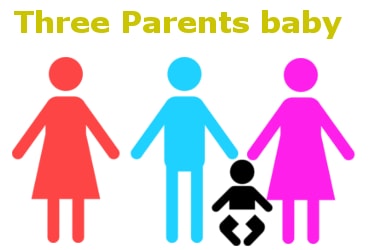
Should designer babies be allowed to become a reality?
The much controversial three parents baby approach is about to become officially allowed in Britain, the first of the countries to give green signal to this technique. Designer babies, as a concept, have always garnered mixed response from people. Gene editing could be a medical miracle that makes people wonder and both fear the unknown.
Britain is about to give official license for in-vitro fertilization (IVF) treatment designed to create three parent babies. The process is called mitochondrial transfer and is said to bear the cure for incurable inherited diseases. This means that the first three parent baby could be born next year. Soon other countries will follow the lead and three parent babies or designer babies will become a common practice.
Yes1. Preventing diseases: Three parents in-vitro fertilization technique could be the only hope to prevent the most incurable of inherited diseases. Mitochondria, the energy house of human cells, are responsible for mitochondrial diseases that pass from parents to off-springs. These diseases are usually incurable like diabetes and congenital heart disease. The only way to ensure that they are not passed on to the child even if one of the parents bears the gene is to swear by three parent IVF technique.
2. Correcting the faulty DNA: The process called mitochondrial replacement therapy (MRT) will be a big help in preventing terribly life-threatening diseases that pass from mother to children. These diseases are responsible for child fatality in a huge number of cases where women are able to have children but they do not survive.
3. Retaining one’s own gene: The mother can get the faulty DNA replaced while ensuring that the child gets the full set of 46 chromosomes from the mother and father. These are the DNA that determines the looks of the child. The mitochondrial changes will only be aimed at correcting the deficits that cause inherited diseases.
4. Same as donating sperms and eggs: Sperm and egg donation has been widely accepted in most countries now. This too was once a controversial topic where people feared the unknown interference of science over something that is supposed to be a natural process. The three parent designer baby concept is not going to be any different too. The donor will have no legal claims over the child in this case as well.
5. Only to treat diseases: Drawing the line that the treatment will only be meted out to correct mutated DNA that bear the risk of diseases is ensuring that the process will not be misused to make designer babies with distinct facial features. If treating these diseases is possible, it would be unfair to stand in the way of such an inventive and corrective procedure.
No1. The big risk: The process comes with a big risk that the mutated embryos will remain in small amount in the genetically treated and designed embryo. They can always bounce back and scupper the therapy. In these cases the whole cause of going through all the trouble will be lost and the child might suffer from an even more mutated form of the same mitochondrial diseases.
2. Ethical concern: If the child born out of this process is at the risk of retaining the faulty DNA and turning it into something that is even more harmful, there is a good chance that the child will grow up to transfer the same risk to children born to them. We are talking of disrupting the gene pool of an entire generation, the results of which could be highly dangerous too.
3. Human guinea pig: The process has so far been tested on in the laboratory and on animals. No treatment of this kind has ever been performed on a woman to prove the efficacy and safety of the procedure. Britain is being hasty about it and giving out licenses to clinics without considering that doctors will soon be making guinea pigs out of women who are up for this procedure.
4. Fear of the unknown: No one knows for sure how the corrected DNA will behave in different environment and how dominating the mutated DNA could become over time. The risk is far too big to be used as an experiment to prove the miracle of science.
5. Adoption will be a passé: IUI and IVF techniques have already slowed down the number of adoptions done every year. Everyone wants to have babies that will have their DNA but what about those babies who are in need of family and home but don’t have one? The poor don’t get to adopt easily and the rich will be able to afford designer babies. What are the options left for orphans awaiting adoption?
Whether we like it or not, Britain legalized the procedure two years back and soon clinics will be given licenses. Brace yourself for the future full of tweaked DNAs and twisted treatments for everything else.